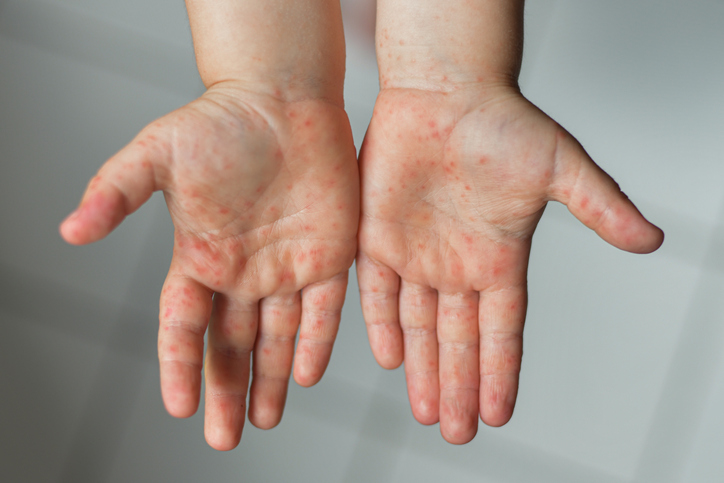Hand, Foot, and Mouth Disease (HFM): Understanding, Symptoms, and Prevention

What is Hand, Foot, and Mouth Disease?
Hand, foot, and mouth disease (HFM) is a highly contagious viral illness, most prevalent among children under five years old. The disease is typically mild, characterized by symptoms like fever, loss of appetite, mouth sores, and a skin rash. Although HFM can cause discomfort, especially due to the painful mouth sores that can make eating and drinking difficult, symptoms generally resolve within a week. While HFM is common in young children, adults can contract the virus as well, albeit less frequently.
Causes of HFM
HFM is caused by a group of viruses known as enteroviruses, most commonly the coxsackievirus A16. This viral infection spreads through direct contact with an infected person’s saliva, nasal mucus, blister fluid, or feces. It can also be transmitted through respiratory droplets when an infected person coughs or sneezes, or by touching contaminated surfaces.
Symptoms of Hand, Foot, and Mouth Disease
Initial Symptoms
- Fever: Often the first sign, typically mild.
- Loss of Appetite: A general decrease in eating due to mouth discomfort.
- Malaise: A feeling of being unwell.
Mouth Sores
These painful sores usually appear a day or two after the fever begins and can be found on the tongue, gums, inside of the cheeks, and roof of the mouth. They start as small red spots and may develop into blisters.
Skin Rash
The characteristic rash consists of small red spots, often with a fluid-filled blister on top. The rash usually appears on the palms of the hands, soles of the feet, and around the mouth but can also affect the buttocks, legs, and arms. Unlike many other rashes, it generally does not itch.
Contagious Period
HFM is most contagious during the first week of illness. However, the virus can continue to be spread for several weeks through respiratory secretions and for months via feces. Children should stay home from daycare or school during the fever and until blisters have dried.
Preventing Dehydration
The painful mouth sores can make swallowing difficult, increasing the risk of dehydration. Ensure your child stays hydrated by offering cold drinks and soft foods that are easier to swallow. Avoid acidic or spicy foods that can irritate mouth sores.
Recognizing Severe Cases
While most cases of HFM are mild, severe cases can occur, particularly with different strains of the virus. Symptoms like prolonged fever, severe rash, or dehydration should prompt a visit to a healthcare provider.
Diagnosing HFM
Healthcare providers usually diagnose HFM based on the patient’s age and the appearance of the rash. Laboratory tests are rarely needed but can confirm the diagnosis if required.
Also read: Baby Heat Rash: Understanding, Treating, And Preventing Prickly Heat
Treatment for Hand, Foot, and Mouth Disease
There is no specific medical treatment for HFM. Management focuses on relieving symptoms and ensuring the child remains hydrated. Here are some strategies to help ease discomfort:
- Pain Relief: Over-the-counter pain relievers like acetaminophen or ibuprofen can help manage pain and fever. (Never give aspirin to children due to the risk of Reye’s syndrome.)
- Mouth Rinse: For older children, a saltwater rinse can soothe mouth sores.
- Hydration: Encourage the intake of cold drinks, milk products, ice cream, and ice pops.
- Soft Foods: Offer non-irritating, soft foods to eat.
When to Seek Medical Attention
Contact your healthcare provider if your child:
- Shows signs of dehydration, such as dark urine or lack of urination.
- Is lethargic or unresponsive.
- Has a fever lasting more than three days.
- Exhibits symptoms for more than 10 days.
- Has a weakened immune system.
- Is under six months old and has a fever.
Preventing HFM Spread
While there’s no vaccine for HFM in the U.S., certain measures can reduce the risk of infection:
- Hand Hygiene: Teach children to wash their hands frequently, especially after using the toilet, blowing their nose, or before eating.
- Avoid Sharing: Do not share utensils, cups, or personal items.
- Clean Surfaces: Regularly disinfect common surfaces and toys.
- Isolate the Infected: Keep infected children at home until they recover.
- Cover Coughs and Sneezes: Encourage covering the mouth and nose with a tissue or elbow.
HFM in Adults
Adults can contract HFM, though it is less common. Adults usually have antibodies from previous exposure but can still get infected, particularly with different virus strains. Symptoms in adults may linger longer, especially the rash and sores.
HFM During Pregnancy
Pregnant women exposed to HFM have a low risk of complications. However, if the virus is contracted shortly before delivery, there is a chance of passing it to the newborn, usually resulting in a mild case. Pregnant women should practice good hygiene and consult their healthcare provider if exposed.
Conclusion
Hand, foot, and mouth disease, while uncomfortable, is usually a mild illness that resolves on its own. Monitoring for symptoms, maintaining good hygiene, and ensuring hydration are key to managing and preventing HFM. Contact your healthcare provider if you have concerns about severe symptoms or complications.
FAQs
Q: Can adults catch HFM from children?
A: Yes, adults can catch HFM, especially if they haven’t been previously exposed. Adults may experience longer-lasting symptoms.
Q: How can I prevent my child from getting HFM?
A: Encourage frequent handwashing, avoid sharing personal items, and disinfect commonly touched surfaces.
Q: Is there a vaccine for HFM?
A: No, there is currently no vaccine for HFM in the U.S.
Q: How long does HFM last?
A: Symptoms usually last about a week to 10 days. The virus can remain in the body longer, so continue good hygiene practices.
Q: Should I keep my child home from school with HFM?
A: Yes, keep your child home until they are fever-free, blisters have dried, and they feel well enough to participate in activities.
Read more: What Causes Milia In Newborns And How To Prevent It?






